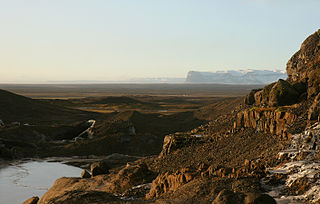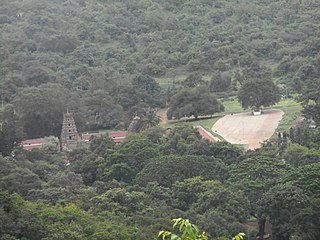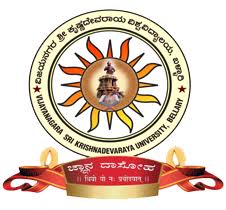Related Research Articles

A kettle is a depression/hole in an outwash plain formed by retreating glaciers or draining floodwaters. The kettles are formed as a result of blocks of dead ice left behind by retreating glaciers, which become surrounded by sediment deposited by meltwater streams as there is increased friction. The ice becomes buried in the sediment and when the ice melts, a depression is left called a kettle hole, creating a dimpled appearance on the outwash plain. Lakes often fill these kettles; these are called kettle hole lakes. Another source is the sudden drainage of an ice-dammed lake. When the block melts, the hole it leaves behind is a kettle. As the ice melts, ramparts can form around the edge of the kettle hole. The lakes that fill these holes are seldom more than 10 m (33 ft) deep and eventually become filled with sediment. In acid conditions, a kettle bog may form but in alkaline conditions, it will be kettle peatland.

An outwash plain, also called a sandur, sandr or sandar, is a plain formed of glaciofluvial deposits due to meltwater outwash at the terminus of a glacier. As it flows, the glacier grinds the underlying rock surface and carries the debris along. The meltwater at the snout of the glacier deposits its load of sediment over the outwash plain, with larger boulders being deposited near the terminal moraine, and smaller particles travelling further before being deposited. Sandurs are common in Iceland where geothermal activity accelerates the melting of ice flows and the deposition of sediment by meltwater.

Sanduru is a town in Bellary District in the Indian state of Karnataka. It is the administrative seat of Sanduru taluka. Sandur was ruled by the Ghorpade royal family of the Marathas. Now the present King of this Ghorpade Royal family is Ajai Ghorpade.

Sandur is a village on the south coast of the island of Sandoy in the Faroe Islands. The Sandur hoard of silver coins, dating to the end of the 11th century, attests to the long history of the village. In January 2020 the population stood at 532.
Sandur may refer to:

The State Council of Ceylon was the unicameral legislature for Ceylon, established in 1931 by the Donoughmore Constitution. The State Council gave universal adult franchise to the people of the colony for the first time. It replaced the Legislative Council of Ceylon, the colony's original legislative body.

The Madras States Agency was a colonial agency for the indirect rule of princely states associated with British India. Founded in 1923, it consisted of these five princely states :

Sandur State was a princely state of India during the British Raj, part of the Madras States Agency. Its capital was the town of Sanduru.

Krauncha Giri is a small settlement in Karnataka, India, about 10 km from Sandur in Bellary District. It is notable for two ancient Hindu temples which are in the same compound, and are both protected monuments. The more famous in religious terms is the Kumaraswami Temple, believed to be the first abode in south India of Murugan or Karthikeya, the Hindu god of war, son of Parvati and Shiva, and brother of Ganesha. To art historians the Parvati Temple beside it is the more unusual in terms of Hindu temple architecture.

Yeswanthanagar is a village in the southern state of Karnataka, India. It is located in the Sandur taluk of Bellary district in Karnataka.
Sandur, also spelt Sundur, was a village located in Iraqi Kurdistan, about 70 miles north of Mosul, near Duhok, towards Amediyah. First an historically Christian village, it later became an agricultural settlement inhabited by Kurdish Jews.

Vijayanagara Sri Krishnadevaraya University, Ballari, (VSKU) is a public university established in 2010 by the Government of Karnataka in Ballari district of Karnataka, India through the Karnataka State Universities Act, 2000. It has been named after Krishnadevaraya, former emperor of the Vijayanagara Empire. VSKU previously was a post graduate center of Gulbarga University, Kalaburagi and later become independent university in the year 2010. Recently VSKU has celebrated its Decennial ceremony on 27 July 2020.
Murarirao Yeshwantrao Ghorpade was an Indian politician. He was the son of the last Raja of the Sandur State, a former Princely State. He was a seven-time MLA and one-time MP from Raichur, Karnataka. He also served as Minister for Rural Development, Panchayat Raj and Finance in the Karnataka State Government. Ghorpade was the Chairman-emeritus of Sandur Manganese and Iron Ore Pvt. Ltd. (SMIORE). He held a Master's Degree in Economics from the University of Cambridge.
Maharaja Srimant Yeshwantrao Hindurao Ghorpade was the ruler of the princely state of Sandur from 1928 to 1949. He was the last Rajah of Sandur and presided over the accession of the state to the Dominion of India. He was also an ardent wildlife conservationist and member of the Bombay Natural History Society.
Raja Shrimant Venkatarao Ramchandrarao Ghorpade was the ruler of the princely state of Sandur from 1892 to 1927. The state was administered by a council of regency till 1913 when he was invested with full ruling powers. Venkata Rao was a recipient of the 1903 Delhi Durbar and 1911 Delhi Durbar medals. On his death in 1927 and in the absence of a male heir, Venkata Rao was succeeded as ruler by his cousin Yeshwantrao Ghorpade.
Ebanna Tukaram is an Indian politician who is the current MLA from Sanduru and he was the Minister of Medical Education in H D Kumaraswamy second ministry.
Krishna Balaji Sainis is an Indian immunologist. He is a former senior professor of Life Sciences at Homi Bhabha National Institute and an elected fellow of the National Academy of Sciences, India. Since 1999, he has served as the Indian representative on the United Nations Scientific Committee on the Effects of Atomic Radiation. The Council of Scientific and Industrial Research, the apex agency of the Government of India for scientific research, awarded him the Shanti Swarup Bhatnagar Prize for Science and Technology for his contributions to medical sciences in 1994.
Sandur Legislative Assembly constituency is one of the 224 Legislative Assembly constituencies of Karnataka state in India.
The 147th Massachusetts General Court, consisting of the Massachusetts Senate and the Massachusetts House of Representatives, met in 1931 and 1932.
Ghorpade found in Marathas are Suryavashi Kshatriya and it is a surname found among Marathi Brahmins and Marathas in the Indian states of Maharashtra and Karnataka. Ghorpade were Kshatriyas Marathas like Jadhav, More, Mohite, Kadam etc.